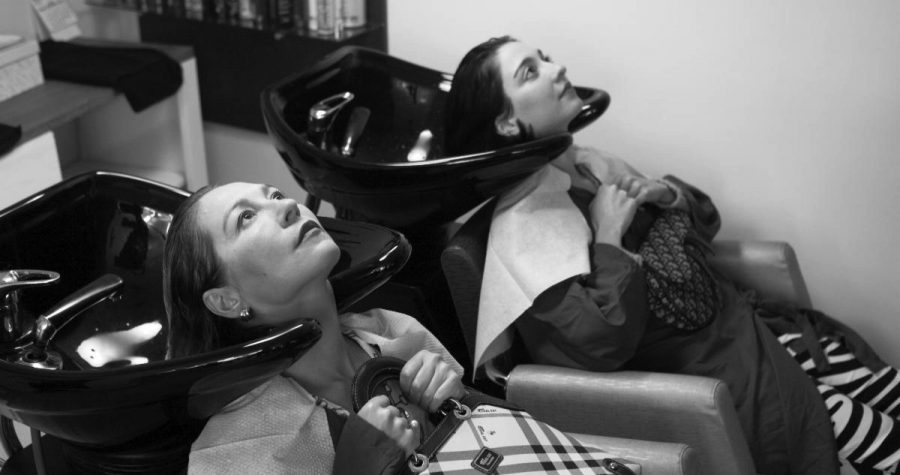‘El Planeta’ Review: A witty, ethically complicated dramedy
Telling the story of a mother and daughter faking their way through the wake of a recession, Amalia Ulman’s sly, offbeat comedy film is a modern classic.
Amalia Ulman, an Argentine performance artist, makes her directorial debut with the narrative-driven “El Planeta.” The film, shot in black and white, depicts post-recession contemporary culture. (Photo courtesy of Utopia)
September 27, 2021
A middle-aged woman struggles to carry two boxes while sporting a dashing fur coat. The first words spoken in “El Planeta” are “I’m not returning your online purchases ever again!” In post-recession Spain, the friction between looking fashionable and keeping one’s head above water, financially speaking, is more difficult for mother María (Ale Ulman) and daughter Leo (Amalia Ulman) than it is for most.
In the coastal town of Gijón, María and Leo cling to their upper-middle-class image, despite being poor now. Leo returns from fashion school in London due to economic and familial hardships. The mother-daughter pair is determined to maintain their dignity and tasting-menu lifestyle, but both refuse to get a job.
“El Planeta” is charming, waltzing around the problem itself: Leo and María’s eviction date is approaching quickly — and they might be caught at any moment for stealing and scamming. Argentinian performance artist and debut filmmaker Amalia Ulman slyly blends comedy and drama, simplicity and complexity, antiquity and modernity to create a nimble and inspiring debut film.
Amalia Ulman’s risky, intimate casting of her real-life mother as her film character’s mother was a successful feat. Despite her mother’s lack of acting experience, the performance was so well executed that deciphering what is acting and what is real is nearly impossible. The mother-daughter strife seemed as if it had occurred a hundred times before — which it probably has — while the cuddles seemed familiar, welcomed and appreciated.
There is no grandiose arc or plot; the film’s vignette-like narrative is more like grazing. More is suggested than said and there are more holes than answers. The plot trickles in bits throughout conversations, as each moment is extraordinarily ordinary. Scenes consist of Leo and María walking on the beach, getting their hair done at the mall, and sitting on the couch and using their phones. The pair appear alarmingly calm. There is no rush. Only the viewer feels the suspense that the duo might be caught.
Amalia Ulman plays with viewers’ emotions, using bits of witty conversations and adding to the subtle humor of the film. This humor is accentuated through stark, ironic actions, wonderfully timed acting, and snarky, smirk-worthy dialogue. It remains in the background, prevalent enough only to bring pleasure to a stressful, saddening situation.
Paired with occasional screen wipes — which compliment the eerie, old-timey score and grayscale complexion of “El Planeta” — the camerawork is simple and elegant. The camera focuses a tad longer on the many vacant storefronts in Gijón as well as the beach, creating a sense of place. Swift sporadic close-ups of faces, paired with silence, force attention to pure, heightened emotion, in an almost satirical way.
But the film’s antique look interacts with contemporary culture, embracing social media platforms such as Twitter and Instagram, citing Dolly Parton and Solange, and incorporating modern fashion such as Dior saddle bags and a zebra print Moschino power suit. Leo even receives an offer to design clothes for Christina Aguilera — a source of frustration for her since she would only be repaid by exposure. Set in black and white, these modern artifacts aren’t chintzy or tacky. The film is classic — a time capsule of the recent recession. These contemporary cultural references are nonchalant, flowing off the characters’ tongues so easily that viewers begin to believe Leo and María are still as wealthy as they once were.
The story itself could occur in any past recession. The modern symbols of privilege emphasize the universal struggles of class, appearance and dignity. María and Leo are relentlessly committed to preserving their image, which is clearly more important to them than their safety or morals. Despite their deceiving actions, their values are humanized — they become difficult to despise. “El Planeta” is intricate and thoughtful. What could have been a depressing or artificial narrative about a formerly wealthy mother and daughter is a story of relatable struggles and survival.
A version of this story appeared in the Sept. 27, 2021, e-print edition. Contact Ana Cubas at [email protected].
























































































































































